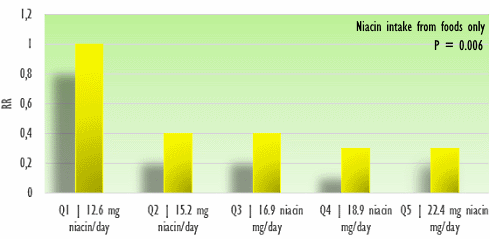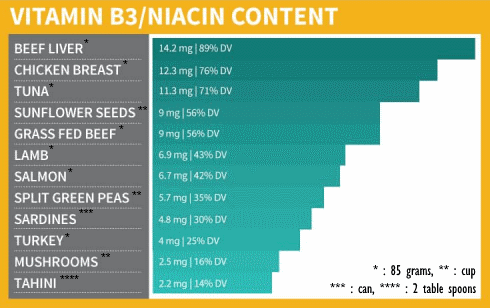Diet rich in vitamin B3 protects against Alzheimer's
A diet with a relatively high amount of vitamin B3 from regular foods such as chicken, peanuts and tuna protects against Alzheimer's disease. This is according to an epidemiological study that American researchers at the Rush Institute for Healthy Aging published in 2013 in the Journal of Neurology, Neurosurgery, and Psychiatry.
Vitamin B3
According to American nutrition scientists, adults should receive 14-17 milligrams of vitamin B3 daily, but not everyone achieves this. Because the body can produce vitamin B3 by converting tryptophan, in developed countries hardly any people get sick due to a lack of B3. This only happens if the intake falls below 9 milligrams of B3 per day.
A vitamin B3 deficiency causes pellagra. Two of the many symptoms of pellagra are premature dementia and psychoses.Study
The researchers used the data from 815 over-65s from the Chicago region. The researchers followed the study participants from 1992 to 2002. When the study started, all the study participants were healthy.
The researchers knew the diet of the study participants. Based on their intake of vitamin B3, they divided the study participants into 5 equally large groups [quintiles in epidemiological jargon]. They then recorded which study participants were diagnosed with Alzheimer's during the study.
Results
The relationship between total vitamin B3 intake and Alzheimer's disease was, ehm, meh. The study participants who consumed a relatively large amount of B3 had less chance of Alzheimer's, but the effect was not overly strong. The effect of the intake of B3 from regular foods was significantly more convincing.
[FONT="]
[/FONT]



[FONT="]
[/FONT]
The 20 percent of the study participants with the highest intake of vitamin B3 consumed on average [wrong translation of 'median', we know] about 22 milligrams B3 daily. For omnivores it is not terribly difficult to achieve that intake. However, vegans will have to put more effort into it.
[FONT="]
[/FONT]

[FONT="]
[/FONT]
The graph below gives an idea of what the effect of a diet with a large amount of vitamin B3 may mean. You look at the calculated effect of a diet with relatively little and relatively much B3 on the cognitive skills of a hypothetical 75-year-old healthy woman.
[FONT="]
[/FONT]

[FONT="]
[/FONT]
Mechanism
In 2019, Italian neurologists published an overview article in Nutrients about how vitamin B3 may protect brain and nerve cells against chronic diseases such as Alzheimer's, Huntington's and Parkinson's. [Int J Mol Sci. 2019;20(4):974.]
According to the Italians, an important mechanism is that B3 is a precursor of enzymes such as nicotinamide adenine dinucleotide (NAD) and nicotinamide adenine dinucleotide phosphate (NADP). These enzymes are not only involved in energy production, but also activate cellular repair and cleaning actions.
[FONT="]
[/FONT]

[FONT="]
[/FONT]
Other B vitamins
According to an epidemiological study by the same American researchers, the intake of folic acid, B6 and B12 from foods is not a big factor in whether or not you get Alzheimer's. [J Alzheimers Dis. 2006;9(4):435-43.]
Source:
J Neurol Neurosurg Psychiatry. 2004;75(8):1093-9.
A diet with a relatively high amount of vitamin B3 from regular foods such as chicken, peanuts and tuna protects against Alzheimer's disease. This is according to an epidemiological study that American researchers at the Rush Institute for Healthy Aging published in 2013 in the Journal of Neurology, Neurosurgery, and Psychiatry.
Vitamin B3
According to American nutrition scientists, adults should receive 14-17 milligrams of vitamin B3 daily, but not everyone achieves this. Because the body can produce vitamin B3 by converting tryptophan, in developed countries hardly any people get sick due to a lack of B3. This only happens if the intake falls below 9 milligrams of B3 per day.
The researchers used the data from 815 over-65s from the Chicago region. The researchers followed the study participants from 1992 to 2002. When the study started, all the study participants were healthy.
The researchers knew the diet of the study participants. Based on their intake of vitamin B3, they divided the study participants into 5 equally large groups [quintiles in epidemiological jargon]. They then recorded which study participants were diagnosed with Alzheimer's during the study.
Results
The relationship between total vitamin B3 intake and Alzheimer's disease was, ehm, meh. The study participants who consumed a relatively large amount of B3 had less chance of Alzheimer's, but the effect was not overly strong. The effect of the intake of B3 from regular foods was significantly more convincing.
[FONT="]
[/FONT]



[FONT="]
[/FONT]
The 20 percent of the study participants with the highest intake of vitamin B3 consumed on average [wrong translation of 'median', we know] about 22 milligrams B3 daily. For omnivores it is not terribly difficult to achieve that intake. However, vegans will have to put more effort into it.
[FONT="]
[/FONT]

[FONT="]
[/FONT]
The graph below gives an idea of what the effect of a diet with a large amount of vitamin B3 may mean. You look at the calculated effect of a diet with relatively little and relatively much B3 on the cognitive skills of a hypothetical 75-year-old healthy woman.
[FONT="]
[/FONT]

[FONT="]
[/FONT]
Mechanism
In 2019, Italian neurologists published an overview article in Nutrients about how vitamin B3 may protect brain and nerve cells against chronic diseases such as Alzheimer's, Huntington's and Parkinson's. [Int J Mol Sci. 2019;20(4):974.]
According to the Italians, an important mechanism is that B3 is a precursor of enzymes such as nicotinamide adenine dinucleotide (NAD) and nicotinamide adenine dinucleotide phosphate (NADP). These enzymes are not only involved in energy production, but also activate cellular repair and cleaning actions.
[FONT="]
[/FONT]

[FONT="]
[/FONT]
Other B vitamins
According to an epidemiological study by the same American researchers, the intake of folic acid, B6 and B12 from foods is not a big factor in whether or not you get Alzheimer's. [J Alzheimers Dis. 2006;9(4):435-43.]
Source:
J Neurol Neurosurg Psychiatry. 2004;75(8):1093-9.


